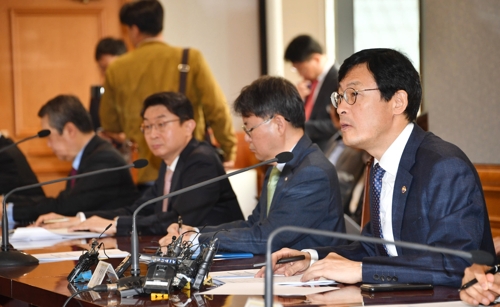South Korea said Monday that it will take steps to stabilize its financial market if necessary but insisted that U.S. tariff hikes on Chinese products may have only a limited impact on the financial market.
Lee Ho-seung, the first vice minister of economy and finance, said that direct effects of the U.S. move on South Korea's real-sector economy are limited, noting that the tariffs will take effect on Chinese goods that depart from China after May 10.
The United States raised tariffs on US$200 billion worth of Chinese goods to 25 percent from 10 percent Friday, prompting China to issue a statement threatening to retaliate.
The U.S. and China ended their trade negotiations without a deal last week, heightening uncertainties in global trade.
Still, the two sides have indicated their willingness to continue holding talks, though no specific time frame has been set.
Lee said the government will maintain round-the-clock tabs on the financial market and take preemptive actions to try to minimize any fallout from the trade frictions between the U.S. and China.
The government will "quickly take timely steps to stabilize the market in case volatility increases dramatically," Lee said in a meeting with senior officials of the central bank and other financial agencies in Seoul.

Lee said South Korea's solid fundamentals, such as foreign exchange reserves, are a key factor that could stabilize the financial market.
South Korea's foreign reserves stood at US$404.03 billion as of end-April, the world's ninth largest, according to the Bank of Korea.
South Korea -- a small, open economy -- depends heavily on exports and foreign capital investment, a situation that makes it vulnerable to external shocks.
Lee also said a drawn-out trade war between the U.S. and China would further weigh on the global economy and contract global trade, which could hurt South Korea's exports.
South Korea's exports fell 2 percent on-year to $48.86 billion in April, extending their on-year decline for the fifth consecutive month, due to a protracted slump in chips and weak demand from China.
Lee said exports could gradually improve in the second half on the back of a recovery in the semiconductor sector, citing earlier reports from local think tanks.
China accounts for about 25 percent of South Korea's total outbound shipments. Among them, semiconductors make up about 40 to 50 percent of South Korea's exports to the world's second-largest economy.
Also Monday, the Korea Development Institute said South Korea's economic activities remain subdued, due mainly to weakening investment and exports.
The state-run think tank said exports exhibited a reduced decrement due to temporary factors, such as increased workdays, but the overall downward trend continued.
In April, imports of semiconductor manufacturing equipment fell 53.6 percent from a year earlier, "indicating continued slackness in facilities investment led by the semiconductor industry," the KDI said in its Monthly Economic Trends published on Monday. (Yonhap)

